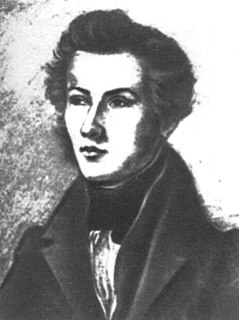A Quote by Bruno Bauer
His very chains helped to deceive him about the harshness of his service.
Related Quotes
At first, man was enslaved by the gods. But he broke their chains. Then he was enslaved by the kings. But he broke their chains. He was enslaved by his birth, by his kin, by his race. But he broke their chains. He declared to all his brothers that a man has rights which neither god nor king nor other men can take away from him, no matter what their number, for his is the right of man, and there is no right on earth above this right. And he stood on the threshold of freedom for which the blood of the centuries behind him had been spilled.
It makes him contemptible to be considered fickle, frivolous, effeminate, mean-spirited, irresolute, from all of which a prince should guard himself as from a rock; and he should endeavour to show in his actions greatness, courage, gravity, and fortitude; and in his private dealings with his subjects let him show that his judgments are irrevocable, and maintain himself in such reputation that no one can hope either to deceive him or to get round him.
There's a story about when President Lyndon Johnson visited NASA and as he was walking the halls he came across a janitor who was cleaning up a storm, like the Energizer bunny with a mop in his hand. The president walked over to the janitor and told him he was the best janitor he has ever seen and the janitor replied, "Sir, I'm not just a janitor, I helped put a man on the moon." See, even though he was cleaning floors he had a bigger purpose and vision for his life. This is what kept him going and helped him excel in his job.
Some souls think that the Holy Spirit is very far away, far, far, up above. Actually he is, we might say, the divine Person who is most closely present to the creature. He accompanies him everywhere. He penetrates him with himself. He calls him, he protects him. He makes of him his living temple. He defends him. He helps him. He guards him from all his enemies. He is closer to him than his own soul. All the good a soul accomplishes, it carries out under his inspiration, in his light, by his grace and his help.
All things are God's already; we can give him no right, by consecrating any, that he had not before, only we set it apart to his service - just as a gardener brings his master a basket of apricots, and presents them; his lord thanks him, and perhaps gives him something for his pains, and yet the apricots were as much his lord's before as now.
Phrases like Worship Service or Service of Worship are tautologies. To worship God means to serve him. Basically there are two ways to do it. One way is to do things for Him that He needs to have done - run errands for Him, carry messages for Him, fight on His side, feed His lambs, and so on. The other way is to do things for Him that you need to do - sing songs for Him, tell Him what's on your mind and in your heart, in general rejoice in Him.
The service a man renders his friend is trivial and selfish, compared with the service he knows his friend stood in readiness to yield him, alike before he had begun to serve his friend, and now also. Compared with that good-will I bear my friend, the benefit it is in my power to render him seems small.
In that hour of trial it was the love of his master that helped most to hold him firm; but also deep down in him lived still unconquered his plain hobbit-sense: he knew in the core of his heart that he was not large enough to bear such a burden, even if such visions were not a mere cheat to betray him.
He discusses his service in Iraq, the wounds he suffered there and he says to me in this ad, until you have the guts to call me a phony soldier to my face, stop telling lies about my service. You know, this is such a blatant use of a valiant combat veteran, lying to him about what I said, and then strapping those lies to his belt, sending him out via the media and a TV ad, to walk into as many people as he can walk into.
His [Turgot's] first important literary and scholastic effort was a treatise On the Existence of God. Few fragments of it remain, but we are helped to understand him when we learn that he asserted, and to the end of his life maintained, his belief in an Almighty Creator and Upholder of the Universe. It did, indeed, at a later period suit the purposes of his enemies, exasperated by his tolerant spirit and his reforming plans, to proclaim him an atheist; but that sort of charge has been the commonest of missiles against troublesome thinkers in all times.
Jesus loved the will of His Father. He embraced the limitations, the necessities, the conditions, the very chains of His humanity as He walked and worked here on earth, fulfilling moment by moment His divine commission and the stern demands of His incarnation. Never was there a word or even a look of complaint.






































